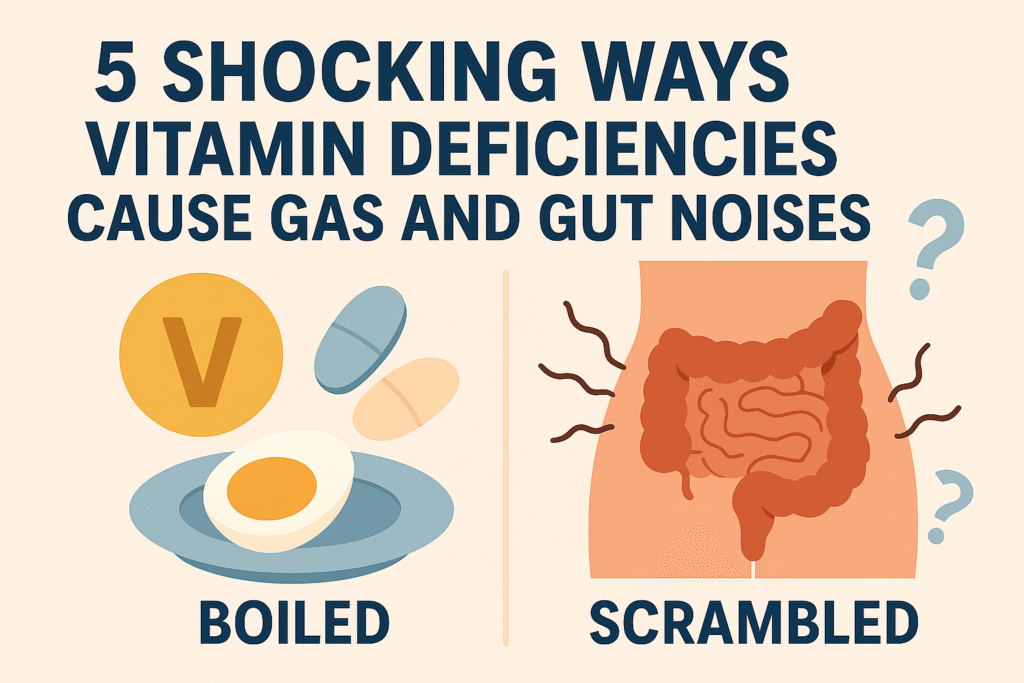
⚠️ Affiliate Disclaimer: This post may contain affiliate links, which means I may earn a small commission — at no extra cost to you — if you make a purchase through one of these links. I only recommend products or services I genuinely trust and believe can provide value. Thank you for supporting My Medical Muse!
5 Sneaky Vitamin Deficiencies That Cause Digestive Issues
Do you often find yourself burping more than usual, dealing with embarrassing gas, or hearing loud stomach noises especially when you haven’t eaten anything strange? While these digestive symptoms are often chalked up to diet or stress, there’s an overlooked possibility you might be ignoring: vitamin deficiencies.
Surprisingly, certain deficiencies can throw your digestive system off balance in subtle ways, leading to everything from bloating to gurgling gut sounds. In this post, we’ll explore how low levels of essential nutrients can affect your gut, what signs to watch out for, and what you can do to restore balance.
Vitamin deficiencies can cause digestive issues like gas, burping, or stomach noises, although they’re not the most common culprits. Deficiencies in vitamin B12, D, magnesium, zinc, and others can disrupt digestion, slow gut motility, and upset the gut microbiome, leading to excess gas production and bloating.
Also Read: Everything you need to know about Stomach Noises
Understanding the Connection Between Vitamins Deficiencies and Digestive issues
1.Vitamin B12 Deficiency:
Vitamin B12 supports the nervous system, including the nerves that help regulate digestion and peristalsis (movement of the gut). Symptoms of deficiency includes bloating, burping, gas, constipation or diarrhea, brain fog, fatigue, numbness in extremities.Low B12 can slow down digestion, leading to fermentation of undigested food. It Increases risk for SIBO (Small Intestinal Bacterial Overgrowth), which is notorious for causing excessive gas, bloating, and rumbling.
2.Vitamin D Deficiency:
Vitamin D is crucial for gut immunity and regulating inflammation. It also helps maintain a healthy microbial balance in your intestines. Symptoms of deficiency includes loose stools or constipation, gurgling sounds in the belly, bloating after eating, fatigue, bone pain and low mood.How it causes digestive issues:
- Low vitamin D is linked to gut inflammation, leaky gut, and dysbiosis
- May impair digestion and absorption of fats and fat-soluble nutrients
Who’s at risk:
- People with minimal sun exposure.
- Those with darker skin.
- People with chronic digestive issues like IBD.
3.Magnesium Deficiency:
Magnesium helps muscles including your intestinal muscles contract and relax. It’s also key for enzyme activity and energy metabolism. Symptoms of deficiency includes constipation or irregular bowel movement, gas and bloating, noisy digestion, muscle cramps, insomnia and anxiety.
How it causes digestive issues: Low magnesium can slow gut transit, causing food to sit longer and ferment.Poor gut motility increases gas and distension
Who’s at risk:
- People on diuretics, antacids, or PPIs
- Those with chronic stress or heavy sweating
- Alcohol consumers.
4.Zinc Deficiency:
Zinc is required for producing stomach acid and digestive enzymes. It also plays a role in gut lining repair.
Symptoms of deficiency: Gas, diarrhea or pale stools, poor appetite, frequent infections or slow wound healing.
How it causes digestive issues:
- Insufficient zinc leads to low stomach acid (hypochlorhydria).
- Poor digestion of protein cause more fermentation and gas.
- Gut lining damage increases sensitivity to foods
Who’s at risk:
- Vegans and vegetarians
- People with malabsorption issues
- Those with chronic illnesses or liver disease
5.Thiamine (Vitamin B1) Deficiency:
Thiamine is essential for carbohydrate metabolism and energy production.
Symptoms of deficiency includes bloating, indigestion, fatigue and irritability, weakness and mental fog.
How it vitamin B1 deficiency causes digestive issues: Inadequate B1 causes incomplete digestion of carbs, leading to fermentation and gas. It also slows down gut metabolism.
Who’s at risk:
- Heavy alcohol users
- Diabetics
- Those with poor diets high in sugar and processed foods
Other Non-Vitamin Causes of Gas, Burping, and Noisy Digestion
Before blaming vitamins, it’s smart to rule out more common causes:
- Swallowed air (talking/eating too fast, chewing gum)
- Carbonated drinks
- Food intolerances (e.g. lactose, gluten, FODMAPs)
- Constipation or slowed motility
- SIBO or gut infections
- Stress and anxiety, which directly impact gut function
- Eating while distracted
When Should You Suspect a Vitamin Deficiency?
Look for patterns like:
- Long-standing gas and bloating without dietary triggers.
- Additional symptoms like fatigue, brain fog, tingling, hair loss.
- Digestive issues that don’t improve with probiotics or diet changes.
- History of restrictive diets or gut disorders.
- Medications that interfere with absorption (e.g., PPIs, metformin).
Nutritional Tips to Support Digestive and Vitamin Health
Focus on Nutrient-Dense Whole Foods like leafy greens, eggs, nuts, seeds, seafood, dairy, and legumes, fortified cereals or nutritional yeast for B12 (especially if vegan). Consider Supplementing Wisely, a well-formulated multivitamin may help cover gaps.
- Test and replace specific deficiencies under a doctor’s guidance
- Support Digestive Health
- Eat slowly, chew well, and avoid overeating
- Add fermented foods: yogurt, kefir, sauerkraut, kimchi
- Stay hydrated and get daily movement.
Final Thoughts
Gas, burping, and stomach noises are common and usually harmless but if they persist or come with other symptoms, it’s worth considering your nutritional status. Vitamin and mineral deficiencies can subtly disrupt digestion, slow gut motility, and promote imbalances in your microbiome.
You don’t need to guess basic blood tests can help reveal hidden deficiencies. Addressing them with food, lifestyle changes, and targeted supplements could make a noticeable difference in your digestive comfort and overall energy.
👩⚕️ Need Personalized Health Advice?
Get expert guidance tailored to your unique health concerns through MuseCare Consult. Our licensed doctors are here to help you understand your symptoms, medications, and lab results—confidentially and affordably.
👉 Book a MuseCare Consult Now